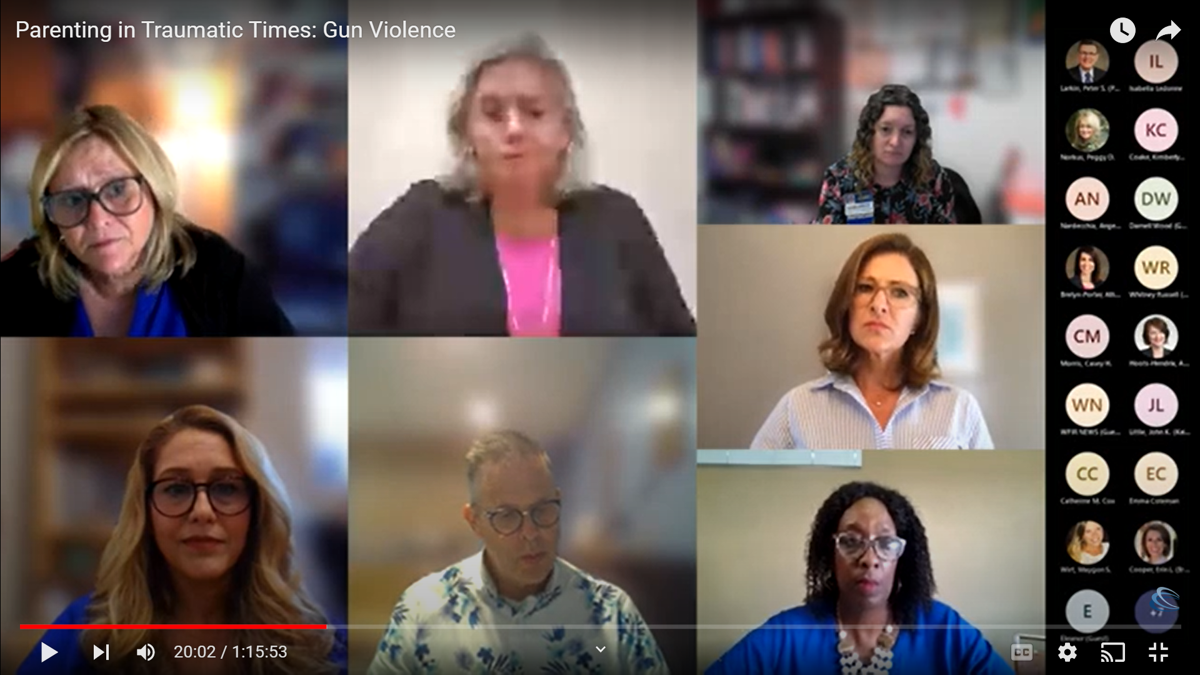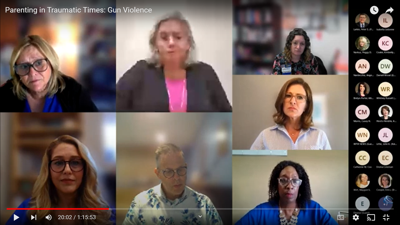Video Clip Courtesy of Carilion Clinic
Children in 166su don’t feel safe, local mental health experts asserted during a community discussion Tuesday. To change that, the children’s parents will have to address generational and systemic traumas.
“We have to help the parents so that they can help the children first,” Dr. Deneen Evans, co-owner of Mosaic Mental Wellness and Health, said in a town hall gathering. “We have to be able to help ourselves to breathe before we can help our children to breathe.”
The virtual discussion, titled “Parenting in Traumatic Times: Gun Violence,” was hosted by Carilion Clinic and Total Action for Progress. It answered questions submitted by community members about mental health as the issue relates to gun violence in the city.
Ashley Carle, a licensed professional school counselor, said 166su’s children and teens are talking about gun violence, “a very real and a very rational fear.”
People are also reading…
“One of the fundamental basic needs for healthy child development is having a safe and supportive environment. And right now, during these times, our kids are dealing with issues of gun violence, racial injustice, income inequality, a global pandemic, climate change,” Carle said. “Our kids are faced with adult issues every day.”
Dr. Kate Liebesny, a Carilion Clinic child and adolescent psychiatry provider, said children seek safe spaces and safe people as they develop, but chronic stress can alter their behaviors.
“Chronic stress changes us,” Libesny said. “Kids who are under chronic stress learn to do things differently than kids who aren’t. They learn to read the emotions around them, to read the behaviors and to shape their responses in ways that can help them predict what’s going to happen next.”
Carle said the suicide rate among young people is increasing, in part because “our kids don’t know how to handle conflict or handle these emotions.”
166su police said a teen committed suicide in the city on Saturday. A press release said officers responded to a call about a person with a gunshot wound at about 11:40 p.m.
Police found an unresponsive juvenile male outside a residence in the 1500 block of Shamrock Street Northwest. An officer provided first aid until 166su Fire-EMS personnel arrived. The teen was taken to Carilion 166su Memorial Hospital, where he died from his injuries shortly after arrival.
Police said a preliminary investigation indicated the gunshot was accidental or self-inflicted. The shooting was the second in September to kill a black male teen. The first, which took the life of Demarion D. Sanders, 15, of 166su, is being investigated as a homicide.
“Too many of our young people in the valley have been dying as a result of gun violence. It has become normal. We’re normalizing it,” Evans said. “It’s a community-based problem. It is no longer just an individual act.”
Joe Cobb, a 166su City Council member and chair of the city’s Gun Violence Prevention Commission, said the city has seen 14 homicides and 37 aggravated assaults that involved the use of a firearm since Jan. 1.
“We have certainly seen an increase in gun violence over the last two years,” Cobb said. “The upward trend of those numbers is very concerning to everyone in the community.”
The councilman is a parent of two children in 166su City Public Schools. He said two bomb threats circulated through a city high school two consecutive days last week, and the communications he received from the school district helped abate his fears.
“None of us, as parents, wants to get a ROBO call from our schools alerting us to an emergency situation,” Cobb said. “But I do think communication — over-communicating, at times — is more helpful for parents, because at least we’re receiving information. Then we know what we need to talk with our children about.”
Dr. Paula Wolfteich, a Carilion Center for Grief and Healing provider, said that while school shootings garner media attention, those kinds of event are rare. The violence that occurs closer to home is more common.
“The children, teens and adults that I see are bringing stories of gun violence in their own neighborhood, outside their window at night, hearing shooting,” Wolfteich said. “There are other forms of violence that kids are experiencing. Even in schools, they’re experiencing other forms. Bullying, watching fights. A lot of kids are exposed to domestic violence.”
Cobb said 166su’s school system has increased the number of mental health workers in its buildings to help children and parents navigate traumatic events and connect them with continued resources in their neighborhoods.
“These family systems have had generational trauma, sometimes intergenerational trauma, that maybe has been undiagnosed or has not been treated,” Cobb said. “When we have organizations like Mosaic of Mental Wellness that acknowledges that reality, then we’re better equipped as a community to address that trauma in an intergenerational way.”
Stacey Sheppard, a Gun Violence Prevention Commission member and Total Action for Progress director of housing and human services, agreed that “trauma begets trauma,” but commission stakeholders and community partners are coming together to find a solution.
“But what’s missing is this community piece,” Sheppard said. “I need to remind everyone there’s a capacity issue with the folks that are doing the work that we’re doing, and we need the help of the community to do this, so that we can break that generational cycle of trauma.”
If you have questions about mental health or grief counseling resources in 166su, you can send an email to CGH_info@CarilionClinic.org or visit .
To watch the complete virtual town hall discussion, visit .









